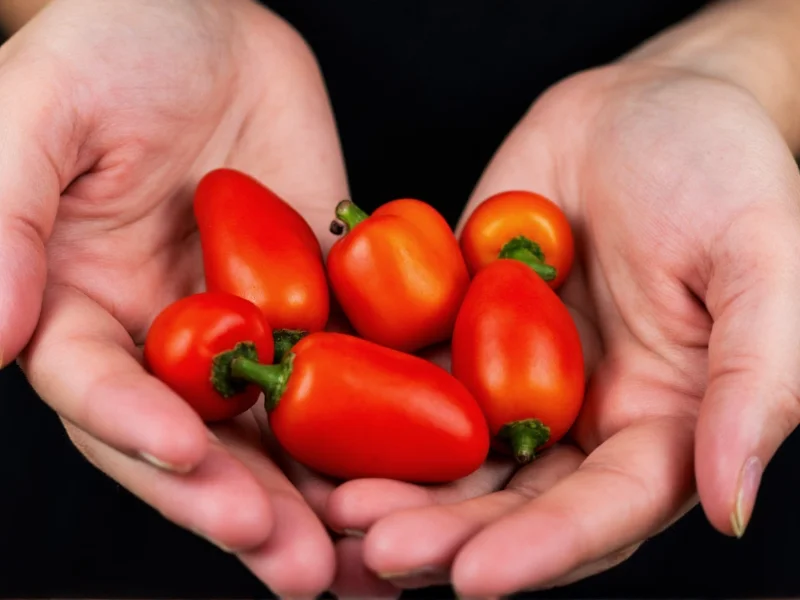Understanding the Science Behind Pepper Hands
When you handle hot peppers like jalapeños, habaneros, or ghost peppers, the capsaicin they contain binds to TRPV1 receptors in your skin. These receptors normally detect heat, so when capsaicin activates them, your brain interprets it as actual burning—even though no physical damage occurs. This explains why pepper hands cause burning without actual burns.
Capsaicin's oil-based nature makes it particularly stubborn. Water won't dissolve it effectively and can even spread the compound to other areas. Understanding this chemistry is crucial for effective pepper hands treatment and explains why certain remedies work better than others.
Immediate Remedies for Pepper Burn Relief
When you experience hot pepper hands, act quickly with these evidence-based solutions:
| Remedy | Effectiveness | Application Method |
|---|---|---|
| Vegetable or olive oil | ★★★★★ | Apply generously, rub hands together, then wash with soap |
| Milk or dairy products | ★★★★☆ | Soak hands for 5-10 minutes in cold milk |
| Dish soap and warm water | ★★★☆☆ | Wash thoroughly with grease-cutting soap |
| Baking soda paste | ★★★☆☆ | Mix with water, apply to affected area, rinse after 5 minutes |
| Water alone | ★☆☆☆☆ | Spreads capsaicin and worsens burning sensation |
Why Oil-Based Solutions Work Best for Pepper Hands
The principle of like dissolves like explains why oil-based remedies are most effective for how to get rid of pepper burn on hands. Since capsaicin is hydrophobic (water-repelling) and lipophilic (oil-loving), oil-based substances can break down and remove the compound from your skin.
Dairy products work through a different mechanism—the casein protein in milk binds to capsaicin and helps wash it away. This explains why does milk help with pepper burn is such a common question among home cooks.
Preventing Pepper Hands: Practical Strategies
Prevention remains the most effective approach for those who regularly handle hot peppers. Consider these evidence-based prevention methods:
- Nitrile gloves (not latex) provide the best barrier against capsaicin transfer
- Apply a thin layer of cooking oil to hands before handling peppers as a temporary barrier
- Use dedicated cutting boards for hot peppers to prevent cross-contamination
- Wash all surfaces and tools with oil-based cleaner after preparing hot peppers
- Consider using pepper mash or pre-chopped peppers from jars for frequent recipes
Common Misconceptions About Pepper Hands Treatment
Several popular remedies for pepper hands home remedies lack scientific backing:
- Water washes away the burn - Water spreads capsaicin and can make burning worse
- Alcohol is the best solution - While somewhat effective, it can dry and irritate skin
- Lemon juice neutralizes the burn - Acidic solutions don't break down capsaicin effectively
- The burn will go away quickly - Without proper treatment, pepper burn can last 24-48 hours
When to Seek Medical Attention for Pepper Exposure
While most cases of why do my hands burn after cutting jalapenos resolve with home treatment, seek medical help if you experience:
- Severe pain lasting more than 48 hours despite proper treatment
- Signs of skin damage like blistering or peeling
- Burning sensation spreading to sensitive areas (eyes, face, genitals)
- Difficulty breathing if pepper dust becomes airborne
For eye exposure, immediately flush with milk or oil—not water—and seek medical attention if irritation persists beyond 30 minutes.
Long-Term Management for Frequent Pepper Handlers
Professional chefs and gardeners who regularly handle hot peppers develop strategies for how to prevent pepper hands when cooking. Building tolerance through gradual exposure can help, but proper protective measures remain essential. Some experienced handlers report that consistent glove use followed by proper hand washing with oil-based cleansers creates the most sustainable approach.
Remember that how long does pepper burn last on skin varies by individual and pepper variety. Mild peppers like poblanos may cause brief discomfort, while super-hots like Carolina Reapers can cause burning for days without proper treatment.











 浙公网安备
33010002000092号
浙公网安备
33010002000092号 浙B2-20120091-4
浙B2-20120091-4